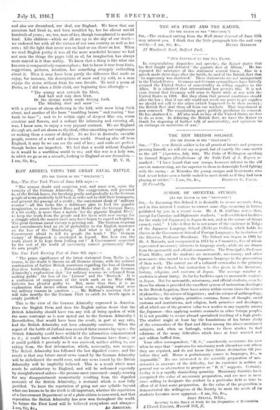HOW AMERICA VIEWS THE GREAT NAVAL BATTLE.
" The utmost doubt and suspicion rest, and must rest. upon the veracity of the German Admiralty. The exaggeration, still persisted in, of the British losses, the breaking gently and gradually to the German people of news prudently held back in order not to chill their transports, and prevent the passage of a credit ; the convenient cloak of military reasons '—all this looks like a deliberate plan to feed the popular imagination, to assure honest Hans and Michel that the German Navy, if a bit costly, is more than a match for the gigantic English Fleet,' to keep the truth from the people and fire them with new energy for a struggle which the master caste may have begun to regard as hopeless. The great German naval victory is petering out. The German evasions and concealments lend an air of probability to the English insistence on the loss of the Hindenburg.' And what is the plight of a Government afraid to tell its people the truth ? The German victory' of Skagerrak is enveloped in legend. But how can the truth about it be kept from leaking out ? A Government suspected by the rest of the world of unveracity cannot permanently dupe its own people."
The New York Evening Post of June 8th says :- " The prime significance of the latest statement from Berlin is, of course, in the doubt it throws on all German claims, with the indirect confirmation of further British assertions regarding the loss of German first-class battleships. . . Extraordinary, indeed, is the German Admiralty's explanation that for military reasons we refrained from tusking public' the loss of the Liitzow and the Restocks' It is a confession of suppression of the truth such as no- War Office hitherto has pleaded guilty to. But, more than that, it is an explanation that incurs odium without even explaining what were the military reasons in question.. . . Mr. Balfour's assertion that it will take months for the German Fleet to catch its breath again. is amply justified."
This is the view of the German Admiralty expressed in America. Does the English Press and does the English nation desire that the British Admiralty should have• run any risk of being spoken of with the same contempt as is now meted out to the German Admiralty ? Nevertheless, that would have been the result, in part at any rate, had the British Admiralty not been admirably cautious. When the report of the battle of-Jutland was received throe courses lay open : the British Admiralty could have withheld the information communicated to it ; it could have embellished it as the Germane have done ; or it could publish it precisely as it was received, neither adding to, nor taking from, the first information, which, necessarily, was meagre. The British Admiralty has followed the last dignified course, and the result is that any future naval news issued by the German Admiralty will be disbelieved the world over, and any news issued by the British Admiralty will be• implicitly believed. This is a result which must needs be satisfactory to England; and will be welcomed especially by straightforward sailors—the persons most concerned—amply atoning for any disappointment momentarily resulting from the dignified restraint of the British Admiralty, a restraint which is now fully justified. To have the reputation of going not one syllable beyond what one knows to be the truth is all-important, whether the reputation of a Government Department or of a plain citizen is concerned, and that reputation the British Admiralty has now won throughout the world. In future the First Lord will be believed everywhere and always—






























 Previous page
Previous page